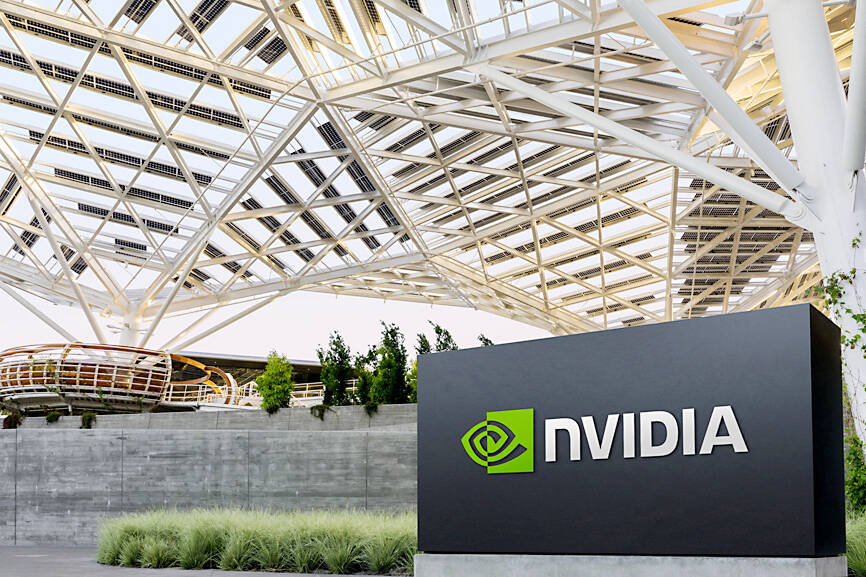Nvidia Corp has added hundreds of staff in China this year to enhance its research capabilities and focus on new autonomous driving technologies.
The world’s second-most valuable company is to end the year with about 4,000 people, up from about 3,000 at the start of this year, sources familiar with its operations said. In a key part of that expansion, Nvidia added about 200 people in Beijing to beef up a team of researchers working on self-driving technology, the people said. The US company also enlarged its after-sales service and networking software development teams, one source said.
Santa Clara, California-based Nvidia is expanding its headcount globally as it works to fulfill runaway demand for its artificial intelligence (AI) chips. China, subject to US trade curbs that prevent Nvidia from selling its most advanced semiconductors, still yielded US$5.4 billion in sales in the September quarter. The country remains an important market and a research hub for the US chip designer.

Courtesy of Nvidia via Reuters
While Nvidia has sought to maintain good relations with Beijing, a Chinese antitrust regulator this week announced a probe into Nvidia’s 2020 takeover of Mellanox Technologies Ltd, which the authorities had conditionally approved earlier. The probe began just weeks after Nvidia CEO Jensen Huang (黃仁勳) highlighted China’s contributions to technology during a trip to Hong Kong.
Company representatives declined to comment.
Beijing’s support for domestic electric vehicle (EV) makers has given it a leading position in pioneering EV technologies and helped lower prices for a new breed of connected cars. Nvidia has been developing driving automation and AI software for over a decade, though its efforts have yet to bear fruit. The company’s China-based researchers would be well-positioned to work with local automakers who are looking for such technologies to enhance their offerings.
As of February, Nvidia had 29,600 employees in 36 countries, the company said in a filing. In China, it expanded over the past couple of years to now have close to 600 people in Beijing and it recently opened a new office in the Zhongguancun tech hub, the sources said.

South Korea’s equity benchmark yesterday crossed a new milestone just a month after surpassing the once-unthinkable 5,000 mark as surging global memory demand powers the country’s biggest chipmakers. The KOSPI advanced as much as 2.6 percent to a record 6,123, with Samsung Electronics Co and SK Hynix Inc each gaining more than 2 percent. With the benchmark now up 45 percent this year, South Korea’s stock market capitalization has also moved past France’s, following last month’s overtaking of Germany’s. Long overlooked by foreign funds, despite being undervalued, South Korean stocks have now emerged as clear winners in the global market. The so-called “artificial intelligence

‘SEISMIC SHIFT’: The researcher forecast there would be about 1.1 billion mobile shipments this year, down from 1.26 billion the prior year and erasing years of gains The global smartphone market is expected to contract 12.9 percent this year due to the unprecedented memorychip shortage, marking “a crisis like no other,” researcher International Data Corp (IDC) said. The new forecast, a dramatic revision down from earlier estimates, gives the latest accounting of the ongoing memory crunch that is affecting every corner of the electronics industry. The demand for advanced memory to power artificial intelligence (AI) tasks has drained global supply until well into next year and jeopardizes the business model of many smartphone makers. IDC forecast about 1.1 billion mobile shipments this year, down from 1.26 billion the prior

People stand in a Pokemon store in Tokyo on Thursday. One of the world highest-grossing franchises is celebrated its 30th anniversary yesterday.

Chinese artificial intelligence (AI) start-up DeepSeek’s (深度求索) latest AI model, set to be released as soon as next week, was trained on Nvidia Corp’s most advanced AI chip, the Blackwell, a senior official of US President Donald Trump’s administration said on Monday, in what could represent a violation of US export controls. The US believes DeepSeek will remove the technical indicators that might reveal its use of American AI chips, the official said, adding that the Blackwells are likely clustered at its data center in Inner Mongolia, an autonomous region of China. The person declined to say how the US government received